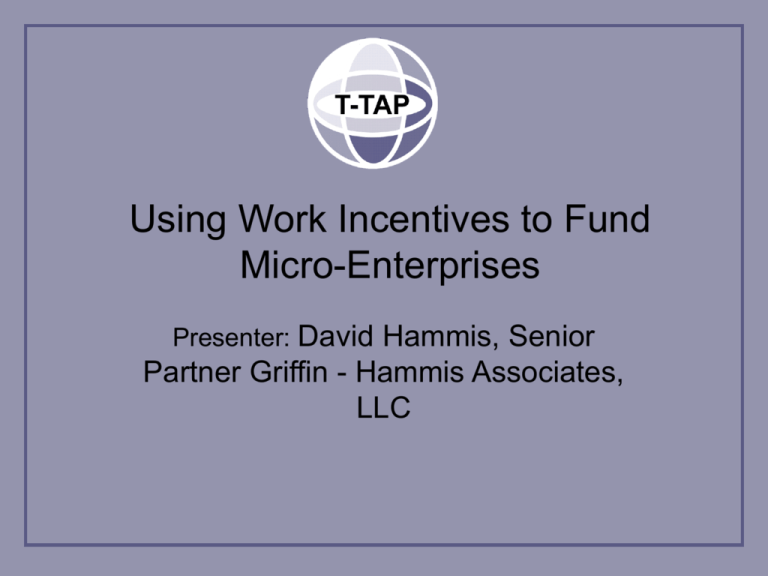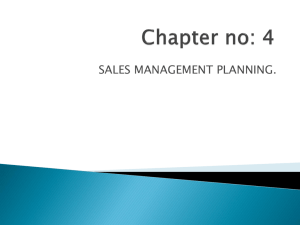PPT - Worksupport.com
advertisement

Using Work Incentives to Fund Micro-Enterprises Presenter: David Hammis, Senior Partner Griffin - Hammis Associates, LLC Self-Employment & Micro-Enterprise I. Overview: Key SSI/SSDI, Work Incentives, VR, WIA, Housing, etc…. Opportunities, Issues, & Interactions with Self Employment Income and Small Business Start-Up Funding II. Example: Blending & understanding multi-level financial resources available through Social Systems, Families and Communities Self-Employment & Micro-Enterprise III. Recommendations: Providing all prospective business owners with disabilities self employment funding options & choices I. Overview NESE for SSI & SSDI purposes: • (Gross Sales – IRS Deductible Business Expenses) x .9235 • Ex.: $20,000 Sales & $10,000 Expenses • ($20,000 - $10,000) = $10,000 • $10,000 x .9235 = $9,235 NESE Property Essential to Self Support (PESS): • SI 01130.501 Essential Property Excluded Regardless of Value or Rate of Return: (A) 2. Trade Or Business Property – Property essential to self-support used in a trade or business is excluded from resources regardless of value or rate of return effective May 1, 1990 • (C) 5. Liquid Resources Used In A Trade Or Business – Effective May 1, 1990, all liquid resources used in the operation of a trade or business are excluded as property essential to self-support Plan for Achieving Self-Support (PASS) • PASS Funding: – PASS directly infuses operating cash into a business, assuming PASS is paying for business operating or capital expenses – PASS does not influence Profit & Loss (P&L) – PASS significantly influences Cash Flow Related PASS POMS (Program Operations Manual System) covering small businesses: • SI 00870.006A.10. Self-Employment Goals • A PASS with a self-employment goal must include a detailed business plan. • The lack of a business plan should not delay an individual's submittal of a request for a PASS. • As with a VR Evaluation, the PASS could initially cover any costs associated with the person developing a business plan, a Business Plan Evaluation. Related PASS POMS • SI 00870.006B.4. Start-up Costs: For someone opening a business, the start-up costs include the expenses to start the business through the first 18 months, or longer if needed, of the business' operation. • The use of an item as a business expense in determining net earnings from self-employment does not preclude its use as a PASS expense during the calendar years (or fiscal years) that encompass the start-up period of a business. Related PASS POMS • SI 00870.006D.4. Self-Employment • A business will be given a minimum start-up period of 18 months unless the individual indicates that less time will be needed for the business to sustain its operations. • A request for a start-up period of a longer duration than 18 months must be justified. Related PASS POMS • SI 00870.025B.5.b. Business Start-up Costs • Treat all expenses, including ongoing costs, to be incurred during the first 18 months, or longer if warranted, of a PASS that involves starting a business as excludable start-up costs if the expenses meet the necessary and reasonable criteria. Related Work Incentives • Impairment Related Work Expenses, same effect as wages employment – yet not as common in small business • Blind Work Expenses – powerful when applicable • All SSI Work Incentives apply (1619(b), Student Earned Income Exclusion, etc. • SSDI has two additional work incentives – UnPaid Help and Unincurred Business Expenses for self employment Other Self-Employment Social System Startup Resources • VR – Direct Purchases of Equipment and other possible expenses – VR Retains ownership of equipment typically – for some time frame that varies by state – VR purchases of deductible business expenses directly impacts P&L – VR funding tends to artificially inflate profits Other Self-Employment Social System Startup Resources • WIA – WIA Direct Purchases of Equipment and other possible expenses – WIA to date does not retain ownership of equipment typically – via innovation and/or customized employment grants – WIA purchases of deductible business expenses directly impact P&L – WIA funding often artificially inflates profits Other Self-Employment Social System Startup Resources • SBA Guaranteed Loans, Bank Loans & NonBank Loans – follow typical business interactions • Medicaid funding – has been used to fund business expenses, and again, similar to VR, artificially inflates profits • Other grants, Native American, Developmental Disability Planning Council, etc… artificially inflate profits Self-Employment Research • High Success Rate: 80 – 90%, Iowa and Rural Institute • High preference rate when presented as an informed choice (20 to 30%) • Very Limited Choice currently in Developmental Disability Employment Services – perhaps less than 1% (no clear data), VR at roughly 4 to 5% • Wide variance in VR Policies nationally Self-Employment & DD Experiential Assumptions • Families Taking the Lead – Highest Use • Is Self-Employment a “Cop-Out” Concerns • Training and Technical Assistance is Needed II. Example Nick’s Business Video Analysis $18,000 VR $10,000 PASS Medicaid Waiver $564 per month SSI Monthly Check & Medicaid • Issues: After High School – no employment for 2 years – VR initial resistance to self employment – Medicaid Supported Living Waiver, fears of losing SSI and Medicaid – Low Assets (Cash below $2000), no Community Rehab Provider would consider Self Employment $564 per month SSI Monthly Check & Medicaid • Solution: Self Employment Family Developed Business Plan – VR & SSA funded – Unlimited Cash and Property Assets – $64,000 Net Profits and Still Medicaid Eligible (1619(b) Policies via Individualized Medicaid Threshold Without a PASS Scenario 2004 Totals Gross Sales: - Business Expenses: Net Profit: $32,703 $10,742 $21,961 Starting Cash - Capital Expenses + Depreciation Adjustment: Owner’s Draw: Ending Cash: $ 255 - $ 3,300 +$ 1,950 - $21,961 - ($1,095) WITH a PASS Scenario 2004 Totals Gross Sales: - Business Expenses: Net Profit: $32,703 -$10,742 $21,961 Starting Cash - Capital Expenses + Depreciation Adjustment: + PASS - Owner’s Draw: Ending Cash: $ 2,121 -$3,300 +$1,950 +$8,828 -$21,961 +$ 9,599 With a PASS Scenario 2004 • Highlights: – SSI Only and no other income prior to PASS and Business NESE Projections • Higher Starting Cash in 2004 – due to PASS effects in 1st 7 Months of Startup in 2003 • Higher Ending Cash – Directly due to PASS – without a PASS = Negative $1,095 vs. with a PASS = Positive $9,599 With a PASS Scenario 2004 • Highlights: – Both scenarios (with or without a PASS) assume that the owner is paid all the net earnings of the business as an owner’s draw – The IRS, SSI, Medicaid, Section 8, & Food Stamps all use the net earnings of the business to calculate taxes owed to the IRS, to reduce SSI, to increase rent and to decrease food stamps – even if not paid to the owner III. Recommendations Recommendations 1. Directive to Disability Employment Service Providers: Provide Self Employment as an employment option Participate in Training and T/A Recommendations 2. Coordinate with SSA BPAO Funded local outreach staff, and VR & Medicaid, Food Stamps, Section 8 Housing Recommendations 3. National/State Grant Sponsored Self Employment Efforts Initial Demonstration & coordinated data & research Followed by Systems Change Policies Recommendations 4. Develop “Capital” (CASH) Loans Guaranteed Employment & Self Employment Loans VR Guarantee Principal Payments Similar to Guaranteed Student Loans Ticket to Work Long Term Payment Approach Recommendations 5. Develop a Professional National Trade Organization To provide structure to professional development & credibility Recommendations 6. Provide Blended Funding On-going Training and T/A Within Social Services Including SBDC, SCORE, Banks and NonBanks, Corporations, Chambers, et al Recommendations 7. Develop a Medicaid Waiver Task Force To review all existing & new waivers for self employment support authority, and concurrence with SSA policies Recommendations 8. Create Baseline data quickly and then clear goals to increase less than 1% usage suspected by targeted increases to research verified 20 to 30% desired Within Existing Employment Services



